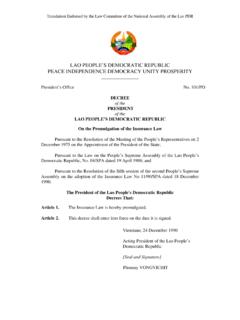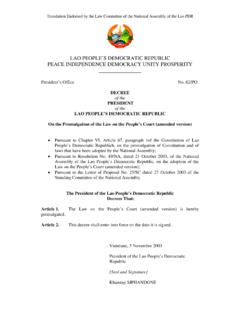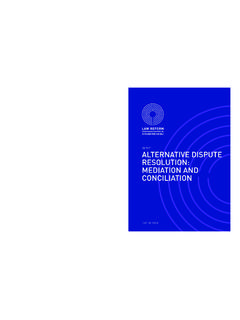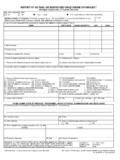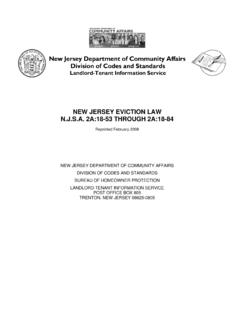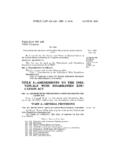Transcription of LAO PEOPLE’S DEMOCRATIC REPUBLIC PEACE …
1 Translation Endorsed by the Law Committee of the National Assembly of the Lao PDR LAO PEOPLE S DEMOCRATIC REPUBLIC PEACE INDEPENDENCE DEMOCRACY UNITY PROSPERITY _____ President s Office No. 97/P 24 December 1990 DECREE of the PRESIDENT of the LAO PEOPLE S DEMOCRATIC REPUBLIC On the Promulgation of the Family Law Pursuant to the Resolution of the Meeting of the People Representatives on 2 December 1975 on the Appointment of the President of the State; Pursuant to the Law on the People s Supreme Assembly of the Lao PDR, No 04/SPA, dated 19 April 1988; and Pursuant to the Resolution of the fifth session of the second People s Supreme Assembly on the adoption of the Family Law, No, 07/90/SPA, dated 18 December 1990.
2 The President of the Lao People DEMOCRATIC REPUBLIC Decrees that: Article 1. The Family Law is hereby promulgated. Article 2. This decree shall enter into force on the date it is signed. Vientiane, 24 December 1990 Acting President of the Lao People s DEMOCRATIC REPUBLIC [Seal and Signature] Phoumy VONGVICHIT Translation Endorsed by the Law Committee of the National Assembly of the Lao PDR LAO PEOPLE S DEMOCRATIC REPUBLIC PEACE INDEPENDENCE DEMOCRACY UNITY PROSPERITY _____ People s Supreme Assembly No. 07/90/SPA 29 November 1990 FAMILY LAW Part I General Principles Article 1.
3 Purpose of the Family Law The Family Law aims to: Preserve and strengthen the family into a firm cell1 of Lao society; Establish matrimonial [and] family relationships based on mutual consent and equality between men and women; Educate children to love the family, [and] nation, and to participate in the protection and development of the nation; Protect the interests of mothers and children in family life and upon divorce; [and] Preserve and develop fine customs and traditions. Article 2. Equality between Men and Women in Family Relationship Men and women have equal rights in all aspects pertaining to family relationships. Family relationships arise independently from the origins, socio-economic status, nationality, ethnicity, educational level, occupation, beliefs, place of residence and 1 The term firm cell is a literal translation and is used as a metaphor for strong component.
4 2 The phrase and others is a literal translation of the Lao term and is not subject to further specificity. 1 Translation Endorsed by the Law Committee of the National Assembly of the Lao PDR Article 3. Freedom to Marry Men and women who have attained the age of marriage have the right to marry on the basis of mutual consent, freedom and love. It is forbidden to force or hinder another individual s marriage. Article 4. Monogamy Marriage is governed by the system of monogamy. Article 5. Protection of Interests of Mothers and Children The state and society protect the interests of mothers and children in family life [when a married couple live together] and when a married couple no longer Part II Proposals And Marriage Chapter 1 Proposals Article 6. Proposals When a young couple enter a relationship of love and decide to marry, the man should ask his parents and elder relatives to ask for the women s hand from her parents and elder relatives according to customs and traditions, and they should decide upon the wedding together.
5 Article 7. Compensation for Failing to Implement Proposals In the event that [a party who has agreed to marry does not implement the proposal and] the man s or the women s honour is damaged or expenses are incurred for wedding preparations, the party who does not implement the proposal shall compensate the other party for such damages. Article 8. Sexual Relations before Marriage If sexual relations occur before marriage and the man does not marry the woman, he shall have to make offerings to restore the spirit4 of the woman or of her family according to custom and tradition. 3 The term co-habitate is used in the sense of living together in the same household, and does not imply that the persons living together are not married.
6 4 The phrase restore the spirit has both a secular sense of repair the reputation as well as a metaphysical sense of undo any spiritual damage . 2 Translation Endorsed by the Law Committee of the National Assembly of the Lao PDR If such sexual relations have resulted in pregnancy, in addition to spiritual offerings, the man shall also have to be responsible for the expenses of childbirth, recovery and others. The man also has the duty to look after the child born from such pregnancy until the child s maturity. Chapter 2 Marriage Article 9. Conditions for Marriage Men and women have the right to marry at eighteen years of age. In special and necessary cases, this limit may be lowered to less than eighteen years of age but not less than fifteen years of age. Marriage must be based on mutual consent from both sides without coercion from any side or individual.
7 Article 10. Prohibition of Marriage Marriage shall be prohibited in the following cases: 1. Marriage between individuals in a state of deficient mental or physical health which could become a threat to the lives or health of their spouses or children; 2. Marriage between individuals from the same bloodline such as parents, paternal and maternal grandparents upwards, with children and grandchildren downwards, between adoptive parents and adopted children, between step-parents and step-children, between adopted children and natural children, between siblings, and between uncles or aunts with nieces and nephews. Chapter 3 Marriage Procedures Article 11. Marriage Consideration and Registration A couple having the intention to marry must submit a written request to the family registrar officer.
8 The family registrar officer must consider5 the request for marriage within a period not exceeding one month from the day such request is received. If it appears that the couple meet all required conditions, the family registrar officer shall invite the concerned6 persons to register their act of marriage in the presence of three witnesses. 5 The single Lao word translated as consider connotes that the person considering a matter also has the authority to decide such matter. 6 The word concerned is used in the sense of relevant . 3 Translation Endorsed by the Law Committee of the National Assembly of the Lao PDR Article 12. Wedding Ceremony A traditional wedding ceremony may or may not be conducted, simultaneously or after the marriage registration, but [if conducted] must not have any legal impact.
9 The matrimonial relationship shall arise from the day the marriage is registered. Chapter 4 Matrimonial Relationship Article 13. Rights and Obligations of the Married Couple The husband and wife have equal rights in all aspects within the family. The husband and wife jointly decide on internal family matters. Spouses have the duty to love, respect, care for and assist each other, to jointly care for and educate the children, and to build the family into a solid, happy and progressive family. Article 14. Married Couple s Right to Engage in Activities The husband and wife have the right to engage in political, economic, cultural and social activities. The selection of the family s place of residence is jointly decided by the married couple. Article 15. Right to Select Family Name The husband and wife have the right to choose either the husband s or the wife s family name or to keep their respective original family names.
10 Chapter 5 Dissolution of Matrimonial Relationship Article 16. Causes for the Dissolution of Marriage A marriage shall be dissolved by the death [of a spouse], by a court decision declaring that a spouse is deceased, by a court decision acknowledging that the marriage is a null marriage or by divorce. Article 17. Null Marriage A null marriage 7 refers to a marriage transgressing any of the conditions in Articles 9 and 10 of this law. 7 The quotation marks have been added and are not in the original. 4 Translation Endorsed by the Law Committee of the National Assembly of the Lao PDR Article 18. Dissolution of Null Marriage The dissolution of a null marriage is within the jurisdiction of the people s court.
